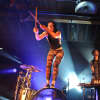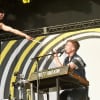Last night, Converse unveiled a new Rubber Tracks recording studio in downtown Boston, where emerging artists and bands will be able to record music at no cost. The 1,100 square foot studio is located beside Converse’s world headquarters on Boston’s Lovejoy Wharf, and will host a new band every weekday beginning on July 1.
Converse Rubber Tracks has been active in Boston since 2013, hosting week-long pop-ups at Q Division studios and organizing free Rubber Tracks Live shows with artists like Chance the Rapper, Action Bronson, and Passion Pit. (Converse was originally founded in the city of Malden, a ten-minute train ride away from Boston.)
The studio itself is outfitted with everything an aspiring band could ask for: a great live room, a diverse microphone locker, a Rupert Neve mixing console, and professional producers/engineers on hand to make the recording process as smooth as possible. So what does Converse get out of it?
“The ideal situation is to make things a little easier for artists,” Jed Lewis, Converse's Global Music Marketing Director, told me in an interview at Converse's headquarters. “By giving artists a platform, or removing obstacles from their path, we allow them to do what they do best, which is being creative. That’s the ideal relationship that we want with artists. It’s not about borrowing from them, it’s about being useful to them.”
“As a brand, Converse owes a lot to music. We wanted to give something back to the next generation of musicians and artists.”—Jed Lewis, Converse
Through Rubber Tracks, Converse is looking to win the loyalty of musicians and artists in a far more effective and culturally valuable way than any traditional marketing campaign could ever achieve. Artists retain all rights to any music recorded in Rubber Tracks studios, and usually even get a free pair of shoes at the end of the session.
The discussion of relationships between independent artists and brands is an ongoing one. In a recent Twitter conversation with Arca, producer Evian Christ recently suggested “less aggressive branding combined with more investment into focused and sustainable projects would be ideal” when it comes to companies looking to win “cool” points by working with artists. And to that extent, Converse seems to view their Rubber Tracks program as more than just an interesting long-term marketing initiative.
“As a brand, Converse owes a lot to music,” Lewis said last night during a panel with Evan Kenney, studio manager of the new Rubber Tracks studio in Boston. “We wanted to give something back to the next generation of musicians and artists.”
It’s easy to assume that the sentimentality is simply marketing double-talk, but actions speak louder than words. The Rubber Tracks team is keen to point out that the studio initiative is specifically for artists that are still on their way up. “The reason that we work with emerging artists is because it gives us a chance to be useful where we’re needed the most,” said Lewis. “Established artists and buzz bands, they already have the means to get into studios. That’s not the purpose of the platform.”
When it comes to selecting who gets to record at the studio, Converse is largely unconcerned with whether applicants are getting any plays or media coverage. Instead, they focus on passion—seeing if the applicants are playing shows, being active on social media—and look for proof that the recording time would truly benefit them. All of this happens before they hear a single song. “It’s not based on who’s gonna be the next big thing,” said Brad Worrell, who oversaw the inception of Rubber Tracks and now manages the Brooklyn studio. “We don’t want to make any decisions based on musical preference.”
When it comes to the free Rubber Tracks Live shows, Converse is putting unsigned artists first, too. Every Rubber Tracks Live show features a Rubber Tracks recording artist as the opener, handpicked by the headlining act. At last night’s frenetic Matt & Kim show in Boston, the selected opening band was The Barbazons, a fuzzy five-piece rock crew from Cambridge with a penchant for driving drums and dueling vocals.
Watching the band toss shakers in the air and recklessly slam toms in front of a fully packed crowd at The Sinclair, I couldn’t help but smile. There was no way in hell they could have sold out that venue themselves and yet there they were, raising hell with rock ‘n’ roll and a little help from a sneaker company. In that moment, it didn't matter if the show was sponsored or not; great music was being (relentlessly) played to a receptive audience, and by the end The Barbazons went home with a couple more fans than they had at the beginning of the night.


